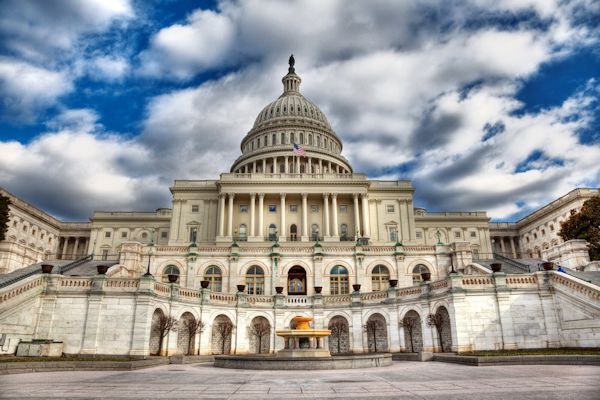SEJournal Online is the digital news magazine of the Society of Environmental Journalists. Learn more about SEJournal Online, including submission, subscription and advertising information.
 |
 |
| Appropriations covering Interior, the U.S. Environmental Protection Agency, energy and water are making their way through the U.S Congress in so-called "minibus" bills. Their passage may yield numerous local stories. Above, the U.S. Capitol in Washington, D.C. Photo: Nicolas Raymond, Flickr Creative Commons. Click to enlarge. |
TipSheet: As Fiscal Year Ends, Local Stories Often Found in Appropriations Bills
By Joseph A. Davis
EDITOR'S NOTE: This story is one in a series of special reports from SEJournal that looks ahead to key issues in the coming year. Visit the full “2020 Journalists’ Guide to Energy & Environment” special report for more.
Legions of local environment stories will be buried in the 2020 appropriations bills that are likely to advance this fall — if you can find them.
The two bills most relevant to environmental journalists are the one covering Interior and the Environmental Protection Agency, and a second covering energy and water.
Keep in mind, though, that they are not the only ones with environmental impact.
The backstory
Federal budgeting is a complex and arcane subject. But appropriations bills are where the check for federal spending actually gets written.
Constitutionally, appropriations bills originate in the House. Traditionally, appropriations for multiple agencies have been packaged in 12 bills produced individually by 12 appropriations subcommittees in each chamber.
Congressional appropriations in recent years
have become an unpredictable wild card.
The problem is that congressional appropriations in recent years have become an unpredictable wild card.
In recent years, politics has been getting messier and Congress has had to strain to pass bills. Appropriations bills often do not get passed by the beginning of the fiscal year on Oct. 1. The remedy has been stopgap, or “continuing” resolutions and “omnibus” bills lumping many appropriations bills into one.
Why it matters
You may have heard of pork-barrel politics. Well, there is actually such a thing as environmental pork.
For instance, some of the money that cleans up water pollution by building sewage treatment plants comes from federal appropriations.
Most members of Congress want money for local projects because it makes them popular with voters. Appropriations subcommittee chairpersons build support for their bills by including something for (almost) everybody. The result is enough votes to pass the bill.
Also, in an effort to salvage a bit of order and predictability, appropriations have recently developed “minibus” bills. Minibus bills lump together five or so of the individual appropriation bills.
This year — fiscal 2020 is the year in play — the House passed the Energy and Water Appropriation in one minibus (H.R. 2740) last June 11, 2019, and the Interior-EPA bill in a different minibus (H.R. 3055) on June 25.
These bills were passed on party-line votes with virtually no GOP votes. Dems added money that President Donald Trump’s budget had proposed cutting, and included “riders” blocking or reversing many Trump policies.
Senate subcommittees have not taken up either of these bills (or produced their own). This may mean the dealmaking is all behind the scenes, or that GOP Senators are determined to resist.
If no deal happens between House and Senate (or Dems and GOPers), a series of shorter-term continuing appropriations based on last year’s levels is the likely outcome.
Story ideas
- Are there any sewage-treatment projects proposed for your district under the Clean Water State Revolving Fund?
- Are there any drinking water projects proposed for your district under the Drinking Water State Revolving Fund?
- Is there an Energy Department National Laboratory in your state? How did its funding come out?
- What, if any, water projects in your state are in the bill? What, if any, energy projects in your state are in the bill?
- Are there any “riders” in either of the above-mentioned bills that address policy conflicts affecting your state? What was said about them in floor debate (see Congressional Record)?
Reporting resources
- Check the committee reports on the House bills — Energy-Water H.R. 2960, H. Rept. 116-83 and Interior-EPA H.R. 3052, H. Rept. 116-100.
- Check the Congressional Record for debate and votes on House floor amendments and debate on the two bills.
- Call your congressperson or senator and ask what local or regional projects are in the two bills.
- Talk to local and regional environmental groups about what’s in each bill. Talk to energy lobbyists and any contacts you may have in your state capital.
- Do any of the news organizations in your state have a Washington bureau? Read its reporting or give a call to see what the hot projects are.
Joseph A. Davis is a freelance writer/editor in Washington, D.C. who has been writing about the environment since 1976. He writes SEJournal Online's TipSheet and Reporter's Toolbox columns. Davis also directs SEJ's WatchDog Project and writes WatchDog Tipsheet, and compiles SEJ's daily news headlines, EJToday.
* From the weekly news magazine SEJournal Online, Vol. 4, No. 34. Content from each new issue of SEJournal Online is available to the public via the SEJournal Online main page. Subscribe to the e-newsletter here. And see past issues of the SEJournal archived here.













 Advertisement
Advertisement 



